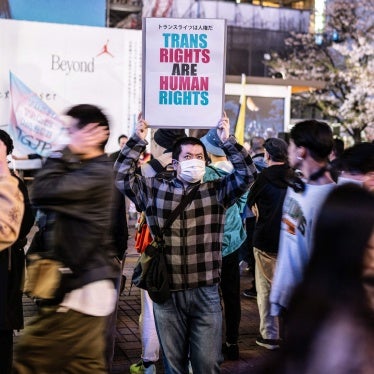Transgender communities across Asia and the Pacific are fighting assiduously for their rights, but the region’s governments have a long way to go in recognizing these rights, a report released this week by the Asia-Pacific Transgender Network (APTN) says.
The “blueprint” report sets out four human rights priorities for transgender people in the region: freedom from violence, freedom from stigma and discrimination, the right to the highest attainable standard of health care, and legal gender recognition (the ability to change your identity documents to reflect preferred gender).
These basic demands stand in stark contrast to the experiences of many transgender people in the region.
Malaysia prosecutes people whose gender identity differs from the sex assigned to them at birth under state laws that prohibit “a male person posing as a woman” and in some cases, “a female person posing as a man.” Human Rights Watch documented rights violations against Malaysia’s transgender women including arbitrary arrests, sexual assault, torture, employment discrimination, stigmatizing treatment by health workers, and a ban on sex reassignment surgery.
Elsewhere in Asia, legal recognition of one’s preferred gender is possible, but it can require irreversible and invasive procedures. Japan, Singapore, South Korea, Taiwan, Hong Kong, and China all require sex reassignment surgeries and sterilization as part of the legal process – a humiliating provision often coupled with other discriminatory requirements such as mental illness diagnoses.
Even countries where there has been some legal progress don’t go far enough. India’s Supreme Court ordered the government to protect transgender people’s rights, but police there arbitrarily arrest, torture, and deny services to transgender people. Thailand recently passed Southeast Asia’s first non-discrimination law to protect gender expression, but it still does not have a legal gender recognition policy – even though it’s known as a regional hub for sex reassignment surgeries.
The APTN co-published this report with the United Nations Development Programme and the World Health Organization – two UN agencies that joined 10 other agencies in a joint statement last week calling for an end to violence and discrimination against LGBTI people. This is significant.
The agencies pledged to “support and assist Member States and other stakeholders … including through constitutional, legislative and policy changes, strengthening of national institutions, and education, training and other initiatives to respect, protect, promote and fulfil the human rights of all LGBTI people.”
APTN’s blueprint charts the course for such action, and governments should use it urgently to work to improve the health and human rights of transgender people.









